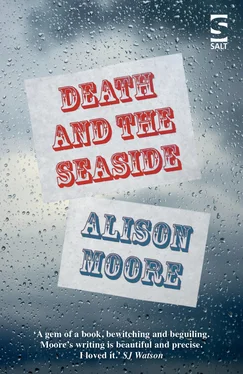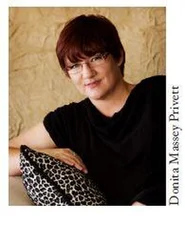It was still dark. And there, again, in the middle of the window, was a familiar white square. She stared at it, knowing that if she crossed the room and tried to touch the piece of paper that was stuck to the glass, she would find that she could not: her fingers would slip right over it as if it were frozen beneath ice. She crept to the end of her bed, towards the closed window, through which she could hear the sea and the crying of gulls, which sounded like laughter, and she said to them, through the glass, ‘Don’t you sleep?’
There did seem to be something written on the piece of paper. It was not quite legible, but Bonnie believed that she could almost see the hint of the word that was written there: ‘JUMP’.
Her pack of cigarettes was still on the windowsill. It was face up, and the label said ‘Smoking kills’. Bonnie extracted a cigarette, reached for the window handle and eased the window open. It was astonishingly dark out there: there were no lit street lamps, or stars visible in the sky; there was no moon. She could barely see the pavement below. In the darkness, she could hear very clearly the pull of the tide. But where was her lighter? It was not in the packet with the cigarettes, nor loose on the windowsill. Perhaps it was in her shoulder bag, which she did not have. She pulled the window to again and put the unsmoked cigarette back inside the packet. She went back to her bed and her pillow.
She dreamt about nothing.
‘My door was locked,’ said Bonnie to Sylvia, who was coming into the room with a bowl of ice cream, like Bonnie’s mother when Bonnie had her tonsils removed.
‘Sorry, Bonnie,’ said Sylvia, shutting the door behind her and coming over to the bed. ‘I decided to lock your door because you’ve not been well, sometimes hardly able to get out of bed, and if you couldn’t get to the door to lock it from the inside, I had to lock it from the outside, to keep you safe. That makes sense, doesn’t it?’
‘And I still don’t know where my bag is,’ said Bonnie.
‘Have you not got it?’ asked Sylvia. ‘I’m sure it will turn up before we leave.’
‘I saw another note,’ said Bonnie.
‘Another note?’ said Sylvia.
‘Yes,’ said Bonnie. ‘Like the one I found under the door yesterday, except that this one was on the window.’
Sylvia frowned. She put her hand to Bonnie’s forehead. ‘You ought to rest,’ she said. ‘You’ve not been well.’
‘I would like to get some fresh air though,’ said Bonnie. ‘I’d really like to go down to the seafront.’
‘Soon,’ said Sylvia, ‘perhaps.’
Bonnie was feeling rather weak in the legs anyway. She ate her vanilla ice cream, and Sylvia said, ‘Where is this note?’
‘I’m sure I left the first note on the desk,’ said Bonnie. ‘But it’s gone now. I threw the second note in the wastepaper basket.’
Sylvia went over to the wastepaper basket. ‘The basket is empty,’ she said.
‘Yes,’ said Bonnie. ‘And there was a third one as well, stuck to the outside of the window,’ but they could both see, even as she was saying it, that there was nothing there now.
‘I think you’ve been dreaming,’ said Sylvia. ‘Or hallucinating.’
Sylvia herself did not look entirely well, thought Bonnie. She looked rather wide-eyed. Her complexion was shiny and her hair was quite wild. She still had on what might have been the same blue suit, and it looked a little dishevelled. Perhaps this sea air was not doing either of them any good.
‘You’re getting mixed up with what happens in your Seatown story,’ said Sylvia. ‘It’s not surprising, of course. Here you are, in Susan’s room, in Susan’s bed, almost in Susan’s skin. Now you can find your ending. You just have to think: what is she going to do?’
‘I don’t know,’ said Bonnie.
‘Well, as long as you’re in the right frame of mind, in your character’s mindset, it will come. You’re Susan — what happens next?’
Bonnie finished her ice cream and Sylvia took the bowl away, and Bonnie heard her lock the door.
Bonnie woke suddenly, from a dream in which she had dived into water, into the sea, and was looking around on the seabed for something that she had lost. She had been underwater for a very long time, and throughout she had been holding her breath.
She seemed to remember from reading Freud that a dream of diving into water was a ‘crossing a threshold’ symbol relating to the process of waking. It seemed topsy-turvy, because the sea was supposed to be the realm of dreams. In dreams, though, there was all this reversal.
And she had, just before waking, found what she had been looking for, which was a key, a car key. She had lifted it from where it was lying half-buried in the sand, like a gift from the sea.
She could feel something tickling her cheek, and she scratched and rubbed at her face.
She was on the edge of the mattress. She rolled back into the middle of the bed and looked at the window, the night sky. There was no moon — no circle, and no square either. She got out of bed and turned on the desk lamp. Squinting away from the light, she looked down at the headache-inducing carpet, which she could see now had not been properly laid, only cut to size; she could see the loose threads from the rough edges against the skirting boards.
Facing the window, she found that her reflection was missing, as if somehow she did not exist, but then she saw that the window was wide open; it must have been left ajar and caught by the wind. She shivered in the night air and thought that it was lucky that the glass in the flung-open window had not smashed. The draught coming in, blowing the split ends of her hair against her face, must have been what woke her up.
She could smell something damp in the room, something mouldering, a swampy smell.
And then she saw the word.
There was a word on the window. It looked etched into the glass itself, scratched with something sharp, like the point of a compass, and she remembered a boy at school using the point of a compass to scratch a message into his own arm. She did not remember what it was that he scored into his flesh, but it was something short, and perhaps left unfinished.
She went to the window and ran the tip of her forefinger along the length of the word: ‘JUMP’. The surface of the glass was smooth, though; she could see but not feel the engraving. It seemed to be inside the glass, like the warning that appeared like an advertisement within the window of an electric tram in an M. R. James story. What were the words that appeared there? It was, she thought, some lines from ‘The Rime of the Ancient Mariner’, about someone who, having glanced over his shoulder, walks on,
And turns no more his head;
Because he knows a frightful fiend
Doth close behind him tread.
Or perhaps that appeared somewhere else in the story. She had a feeling that what was seen within the window of the tram was a message with a more specific hint of what was coming, but she could not quite remember what it was.
She wanted to touch the outside of the window to see if the writing had somehow been scratched on backwards from the outside. She thought that this message was not quite so far beyond her reach as the previous one had been.
She took her pack of cigarettes from the windowsill. The lighter was inside the packet, where it belonged. She lit up a cigarette and leaned out of the window to puff out the smoke. She could hear the harsh utterances of the gulls, and the sound of the sea toying with the pebbles at its edge, and she flicked her ash to the ground. In a vacuum, or on the moon, she would fall at the same speed as that ash, at the same speed as a feather. She was not in a vacuum though; she was not on the moon.
Читать дальше












